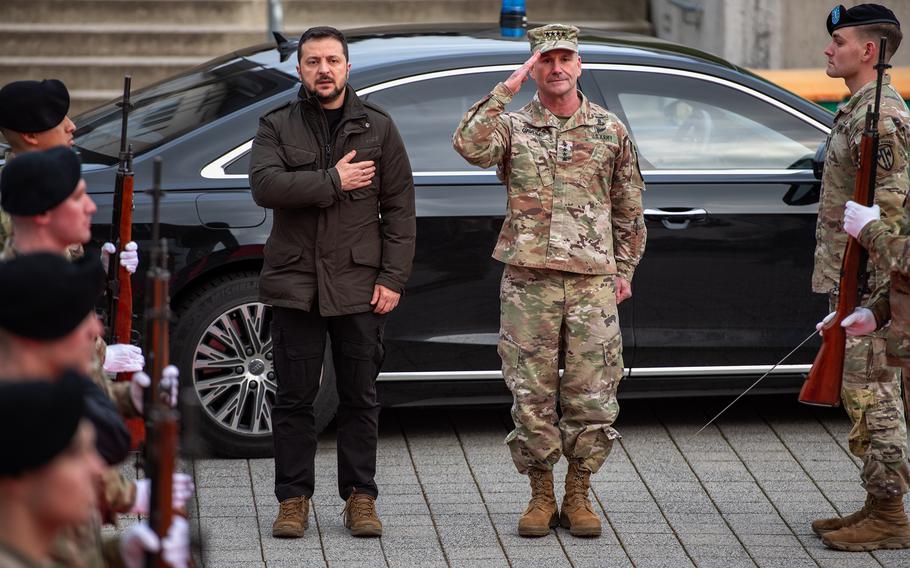
U.S. Army Gen. Christopher Cavoli, the head of U.S. European Command, meets with Ukrainian President Volodymyr Zelenskyy in Germany, Dec. 14, 2023, to discuss ongoing U.S. and international military support to aid the Ukrainian. Cavoli on Monday called for reestablishment of Cold War communication methods with Russia. (Susanne Goebel/U.S. European Command)
STUTTGART, Germany — The United States needs to revive the lines of communication with Moscow that helped both countries avoid nuclear conflict during the Cold War, the top American general in Europe said this week.
“We could read each other’s signals. We knew how to send signals to each other… almost all of that is gone now,” Gen. Christopher Cavoli, NATO supreme allied commander and head of U.S. European Command, said Monday.
Cavoli, speaking during an event at Georgetown University timed to NATO’s 75th anniversary, rattled off numerous upgrades to the alliance as it adapts to counter Russia. The number of NATO troops available to Cavoli in a crisis has surged by some 700% over the past year, he said.
But the transformation in combat readiness doesn’t appear to have been matched at the strategic level when it comes to ensuring that the nuclear powers don’t misread each other’s intentions.
Since Russia’s 2022 invasion of Ukraine, nuclear saber-rattling rhetoric from the Kremlin has become almost routine and arguably more provocative than during the Cold War.
Cavoli, a fluent Russian speaker and foreign area officer by training, said efforts are underway at his NATO headquarters to update some of the old practices for modern times. But there are complications.
“First of all, we’re trying to reestablish it during a hot war that’s being waged” by Russia against Ukraine, he said.
And unlike the Cold War, China’s greater clout makes it a factor when it comes to managing the escalation of tensions, he said.
“There are no longer just two principal parties to determine this question,” Cavoli said. “There’s China in the background and how all this is going to interact on a three-way basis will be a very important question.”
During the Cold War, Cavoli said there was a “very fine and mutually understood vocabulary” between the West and the Soviet Union.
“We knew how to communicate verbally and nonverbally about our intentions in a way that gave predictability to the other side, comprehension to the other side,” Cavoli said. “And this was one of the principal things that we used to manage escalation and to achieve deterrence without significant risk.”
Other factors from the past that were effective included various nuclear treaties, agreements and onsite inspections that helped keep communication lines open, he said.
“We fell out of the habit of using these mechanisms to signal and… we collectively have walked away from many of the arrangements and the treaties that previously gave us the ability to do this,” he said.
Any push to improve how the United States and NATO communicate with Moscow could be challenged by the alliance’s ongoing efforts to bolster its eastern flank with Russia.
The Kremlin in recent years has ramped up its criticisms of NATO and the increasing number of alliance forces positioned in places such as the Baltic states and Poland, which it has characterized as a threat.
Allies have argued that those moves are defensive and only came in response to Russia’s aggression in Ukraine.
“How do we go ahead doing all of this and reestablishing our collective defense capability without being threatening and accidentally having the effect we don’t want?” Cavoli asked. “I think the first step is to describe ourselves openly as what we are — a defensive alliance.”